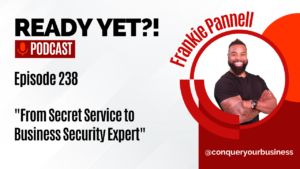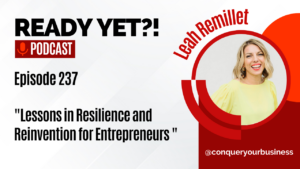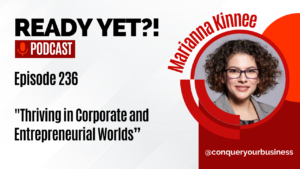a love letter i never thought i'd write
In a million years I would have never predicted that the one thing that has made sooooo much possible in my business, is the same thing I’ve resisted for decades.
Resources
Transcript
Transcribed with Ottter.ai
I am calling that a love letter I never thought I’d write. Like, seriously. So when I first went to put my notes together for this this morning, I thought it’d be really short. And then when I really got into diving into this topic and what I thought about it, it is several pages long. And I laugh at myself because my college boyfriend labeled me the random thought generator and he wasn’t wrong. I, if you see me looking down, I always write outlines for what I want to talk about. Not that I can’t talk about these things without outlines. But if I want to stay on task for you guys, if I want to stay in order that makes sense for my listeners, and there’s always some things that I want to make sure I tell them that. So as I was putting my outline together for this, I’m thinking, Oh, this is really short. This is like a short and sweet little thing that I really want you to know. And it turned out much longer than I expected. So hopefully, this topic will be as helpful to you as what it’s done for my business. So a love letter I never thought I’d write, you may or may not know me, right? You may have been watching for a while, you may be nicer to me. But something that comes through kind of pretty quick about me, I’m not great at following rules, tend to do things my own way, tend to not care what everybody’s supposed to do what anybody thinks I’m gonna do, I will ask for knowledge, I absorb information, I asked trusted sources, I read about a book a week. But I very, very seldom ask a lot of people’s opinions on things, I don’t really ask a lot of people’s opinions on things. And to sum it up, I call this I tend to do what I want to do when I want to do it. And it’s not that I’m irresponsible. I’m like, overly responsible, but I just don’t really ever see a connection between what has to happen, and what I want to have happen. And if I don’t see that connection, I don’t do something. And one of the things that I’ve always, always always put squarely in the eye is that I don’t like it, I don’t care. Not good at it. Not for Aaron, one of the topics that I’ve always always always put into that place, is the idea of following a process following a process. And I always just figured it wasn’t in my DNA, do what you’re great at, let go of what you’re not good at. I don’t follow processes. And the 8 million personality profiles that I have taken in my life have back this up. Aaron doesn’t follow rules. Aaron doesn’t follow processes, right? If you’re familiar at all with disc analysis, that’s one of my favorites. You won’t find this shocking. I’m very, very, very high, ridiculously high, goal driven. That’s a D freedom, a goal driven person. I’m also a very very, very high people person, very interpersonal influencer. I love meeting people, I love talking to people, I love having a good time with people. I’m a big ol extrovert. None of this is surprising. Under the score for compliance, I have if there, if you could get a negative number, I would get a negative number. Like that’s how bad it is. I think I have like four out of 100 Possible Points. And all of them are for accounting because I come out of a background in corporate finance, public finance, right? So I’m not great at compliance. I’m not great at rule files. And for most of my life, until very recently, I have connected following a process to following rules. In my head, I always connected following a process to following rules. Which as we’ve established, I suck at not liking it. I kind of tend to think most rules I don’t follow aren’t for me, right? But now as I look back at my different jobs and my different companies I worked for, what I realized is I’m not good at following rules that to me make no sense, because it’s not like I’m reckless. I follow all sorts of rules. But if I don’t see the correlation between the rules, and the outcome that I want, I tend not to do it. And I remember when I first got out of college, I worked in the apartment complex management world for many years. And there was this report that we used to have to send in every week. There were two reports that we were supposed to send in every Monday morning, and I would only ever send in one. And my manager would call me. Where’s the other report? Where’s your report and I wouldn’t do it and never good. Because the information they wanted was actually in the first report, it was just in a different order. But it was the same information, one order, second order. And this was before Excel and computers and emails and stuff. Like we literally fax these in, we fill them out manually and fax them in. But the information was already in there. And I just thought this was a very big old dumb waste of time. I don’t care what the rule was. I wasn’t following it, because I didn’t see why it would even remotely be necessary. I erroneously say that it is very important. Right now I erroneously use it to connect following rules with following processes. Because of situations like that. The process was I was supposed to fill out these two reports, the rule was, I was supposed to fill out these two reports, Aaron’s behavior was she did not fill out two reports, she filled out one report and the manager eventually gave up. So where am I going with this? I’m like, why should you even care about this? As my business grows? What I am so grateful for, and hence the love letter, what I am absolutely so grateful to have finally figured out is that following processes and following rules are not the same thing. They are not the same thing. I have no problem with you throwing out the rules, in my opinion, following the rules creates the average response. I’m not looking for average, I’m looking to be the exception. So yes, I do not spend a ton of time worrying about rules. Again, don’t be reckless, I’m not talking about the IRS type of rules. I’m not talking about reasonable traffic rules, right? Even there, I say reasonable, like speech and be reasonable, not saying be reckless. But rules create average outcomes, and I’m striving to be an exception. So if you want to grow your business, if you want to truly be that exception, you need to throw out the rules that don’t apply to you. And embrace, embrace, embrace the hell out of processes, and brace the hell out of turning as much as you can of your business into processes. So why is this important? And what do I actually mean? Basically, you already have processes by the way. Third, you just might not realize what they are, because odds are, they’re all in your head. And many of them might not actually be helpful. Either. Some of them are downright sabotaging your business, how you do something, how you go about doing something, if you do it more than once is effectively a process. So think about it this way. Of all the things of all the things that have to happen in your business, all the things, paying bills, posting your online content, getting a newsletter out, doing what you do for your clients, right client fulfillment, doing what you do for your clients, charging your clients, getting them to pay their bills, you pay your bills, they pay their bills, and hear me out here, even getting clients client acquisition, how many and there’s like a million other things you do in your business? How many of those things that happened in your business are documented, repeatable, and predictable? How many of those things are scheduled? And how many of all of that stuff instead of being scheduled and predictable and documented, instead of those? How many of all of that stuff is this happening in your business? Where as the business owner, it’s bumping up against you. Every time it happens, right? It feels physical in nature, when I say it that way, how much of your business has to bump up against you, in order to happen when all of the decisions have to go through you? It’s like going to the beach, right? It’s like being at the beach in the ocean, the lake a little bit the ocean, definitely. Some days, right? You can stand waist deep in the water. And the waves are flowy, right? It’s like an ebb and flow and yeah, they’re touching you, but it’s soft, it’s almost kind of smooth and it just kind of touches you and you feel yourself rocking a little bit comfortably. But then on Sunday it waves right and there you can stand in the same depth of water and some days it’s slamming against you, slamming against you. And then let’s face it, there’s some days where if you went waist deep in the water, the wave would slam against you and knock you off your feet. And before you could get your feet back underneath you the next wave is Common down on your head pushing you lower and lower and lower. Does your business feel that way? Does your business feel that way? Do you feel that in your business? What if instead, what if instead, you could create an environment where you spent much, much, much more of your time in the smooth ebb and flow feeling, and less time getting slammed by waves. The more you document, your optimize your processes, keyword, optimize, document and optimize your processes that run your business. Your business becomes process dependent instead of people dependent, the more pressure relief, you can feel less pressure on you, as the business owner especially means freeing up that mental and physical space, you need to focus on growing your business. This is just like the stories you hear of the people like Steve Jobs, who always wore the same thing every day, because it removed a decision off of his plate. Right? What if you could do that in your business, I’m not a big fan of wearing the same thing every day, you can tell how I feel by how it will color I show up and but what if you could document and optimize your processes on how your business is running, to alleviate that pressure, alleviate that physical feeling of things slamming into you over and over and over again, less stress around this idea that one particular team member who does know how to do something, my I don’t know want to take a day off, have a vacation, God forbid they get sick. So number one, creating processes in your business around everything is massively massively massively stress reducing. Number two, what gets measured gets managed, right? What gets measured gets managed, if you don’t have a process for how things are happening, you’re going to be much, much, much slower on how you are able to identify problems, or respond to problems. Because every time something’s a little bit off, you have to recreate the wheel. Every single time you have to recreate the wheel, you can, you can start to get to where more and more of the things that need to happen in your business happen automatically. They happen automatically creating the processes. I love this concept here. Creating processes in your business is what allows the things in your business to become a habit. I just recently reread atomic habits, right? A habit is something that happens without you thinking about it. Here we go again, stress reducing freeing up energy freeing up time freeing up thoughts. A habit is something that happens automatically, the more you can create your business into a system made up of processes, the more of your business that will happen by habit, meaning they happen with very little thought. So number two processes are massive, massive time savers. That one actually took me a really long time to absorb. It took me a long time to absorb that following a process actually helps me save time. Because in the beginning, it’s work in the beginning, it’s work in the beginning, you have to pay attention, you have to create the process and then it’s not natural to follow the process. You have to think about what you’re doing. You have to think about what you’re doing. So yeah, in the beginning, there’s the uncomfortable part, right? Where we’re figuring this all out. You’re like, oh my god, this is taking so much time. I don’t have time for this. But truthfully, if you can get most of what happens in your business into the point of it being a habit. Ultimately, it’s a massive, massive time saver. So massive stress reducer, massive time saver. Number three processes are kind of what makes your business a business. Having processes is what makes your business a business. Think of it this way. When somebody buys a franchise and somebody buys a franchise, McDonald’s franchise, whatever, Jiffy Lube franchise, what are they buying, they’re buying two things. They’re buying two things. They’re buying brand awareness, aka the ability to collect, market share, right? They’re buying brand awareness, and they’re brought buying a big ol manual of how to do things. That’s it. Those are the two things you buy when you buy A franchise brand awareness. And how do I do this, your business is the same, your business is the same. The two things that give your business value to an external entity, a bank, a buyer, is brand awareness, market share ability, and a dialed in predictable system and processes that can be duplicated. If all of your business if your business is in your head, if your business is in your head, not that you’re making it up, but if everything that happens in your business is in your head, you can’t sell that. You can’t sell it, there’s no exit strategy to this. Because it can’t buy you not going to buy you and yes, it’s completely normal as a business owner to stay on for a period of time after an acquisition. But the value of your business is so so so, so, so much lower. If that business is just dependent on you. Instead of the brand awareness, and the duplicatable, I don’t know how to say duplicable, I don’t know, my journalism degree just completely failed me with repeatable, scalable processes. Ultimately, processes create value. And I will tell you, nobody, nobody, nobody, nobody was more shocked than I was that this is the case. I have now fully embraced having a process for everything. And my CEO, my CEO will absolutely laugh at me. And she and my assistant will roll their eyes when we are in a meeting. And I’m the one saying Do we need a process around this? Because for a very long time, they were creating processes, despite me not because of me. I was the bottleneck. My desire to be flexible, my desire to be able to respond, which truthfully at that point was reacting. This definition in my head that I had incorrectly connected following rules, which I have no desire to do, to following processes, which is now the foundation for everything we do, was screwing everything up. Everything in my business that you have seen happen in the last couple years, everything that’s possible, is only possible because there are processes at its foundation, there are processes at its absolute foundation, everyone’s job is easier this way, everyone’s job, including mine is clear this way. This gives us the mental space, we need to focus on making difficult decisions for figuring out the hard parts about doing business. Instead of getting sucked up with all of our time taking care of business. It creates the way these processes create the way for all of the team, myself included, to have massive flexibility in how we work. And when we work. It gives me peace of mind, because I know everything’s being taken care of. I don’t have to ask. I don’t have to ask Alison tenths of the questions I used to ask her. What about this? What about this? What about because it’s all just taken care of. And I can just check to see if the box has been checked, literally. It’s the base foundation of how we are able to scale period heartstoppers.
So what do you need to do about this? How do you do this for you? I totally understand, like your thought might be if you’ve never jumped into this pool before, your thought might be the same as mine was in the beginning. I need to turn everything in my business into a process. You’re gonna get so overwhelmed. And what happens when we are overwhelmed? Absolutely nothing because we panic and we get overwhelmed and we freeze and we do nothing. That’s a normal response. So it’s the whole and I hate this phrase, but it’s the whole How do you eat an elephant problem, one bite at a time. Don’t try to do everything at once. It can be harder, it can be harder to try to create processes theoretically, than when you have a tangible example. So one of the things we do a lot of is we create our processes as we’re doing the work. We document what we’re doing as we’re doing it so whether it’s a document open on your computer, or if you’re old like me and you like a pad of paper on your desk, when you are doing the things that you’re doing, just jot it down, just jot it down. Pick one aspect of this and then add the next you don’t have to do everything at once. Pick one aspect then add the next. There are a lot of moving parts to getting everything in your business into a system. But it’s a game changer. It is a game changer. And if you think you don’t have time to do this, I would argue you don’t have time not to do this. Use me as an inspiration if you want, because I’m telling you, if I can embrace this, anybody can do it. If I can feel this way and get this way in my business, anybody can do it. Because I was so far on the other end of the spectrum, like you seriously, ask a question, you seriously can’t even imagine it. This is one of the biggest hurdles I see when I’m working with clients. I’m watching people make money despite themselves instead of because of themselves. And this is the type of thing that has the entire business at risk, not having processes in your business and around your business is what puts your entire business at risk. Especially, especially if client acquisition is one of the things you have a zero process around. If client acquisition is one of those things that you have zero processes in place for you are putting your entire business at risk. I have become so serious about this, like this is how far the pendulum has swung. I have become so serious about this, that we have created part of our business to help this exact one problem. We call it systems for success. Because they understand that it’s very, you can’t stop your business and go do this. Instead, you have to be able to do it at the same time. We start where we start with everything, we start with strategy, we start with strategy sessions. And then based on those strategy sessions, we go about creating your systems for you. We’re the ones who can do the heavy lifting for you, my person who put all of these systems in place for me, can be the one to do it for you crazy. I know, this is the big gap, you hear me talk about? What is your client’s biggest problem? And how do you solve it, this is what we’ve seen over and over and over again, this is how we’re helping you solve it. My CEO can be in charge of creating your systems for you. And then train your team. And you because let’s face it, you’re going to need more training than everybody else. Take it from someone who’s been there, train you on how to use those processes. And if you’re anything like me, you shouldn’t be creating your processes, I shouldn’t. I do not create the processes in my business. I helped create the outcomes that we’re trying to achieve. And let the people who are better at it than I am. Work on creating the processes to get there. So let us do that heavy lifting for you. If you’re interested in this, if you’re interested in going deep, hopefully I’ve given you enough information to get started on it. If you’re interested in going deep and solving this problem like yesterday, go to the concrete your business website under work with us. You can see our systems for success. You can also reach out to us through that website, conquer your business.com Let’s just have a conversation and see how we can take away one of the biggest risks we have to our businesses, not having all of our processes dialed in. Get you the stress relief, get you the time saver, create the value, make it all happen. Let’s get your business running like a well oiled machine. Thanks





